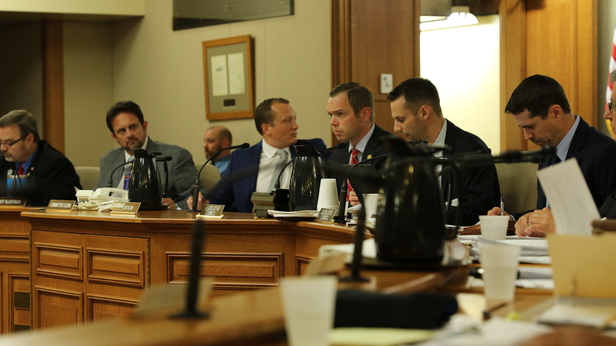
MacIver News Service | August 14, 2017
By M.D. Kittle and Chris Rochester
[Madison, Wis…] Foxconn Technology Group’s plan to build a $10 billion high-tech manufacturing campus in southeast Wisconsin is one step closer to reality.On Monday, the Assembly Committee on Jobs and the Economy passed an amended $3 billion incentives package – the largest in state history. The 8-5 party-line vote followed two and a half hours of committee discussion, mostly around 23 amendments to the bill put forward by Democrats on the committee earlier in the day.
“These are companies from other states coming here. Why? Because finally, the state of Wisconsin is becoming friendly to them coming here,” said Rep. Joel Kleefisch (R-Oconomowoc), citing other companies that located in southeast Wisconsin like Uline and Amazon.
Borrowing an analogy used by Gov. Scott Walker, Rep. Pat Snyder (R-Schofield) compared the Foxconn deal to the Packers transforming their image by signing defensive superstar Reggie White.
“It will suddenly say to everyone else that Wisconsin is turning the corner in the new manufacturing field that Foxconn is going to produce, and we will be a destination site for the future,” Synder said.
Assembly Republicans on Friday rolled out a Substitute Amendment package with seven changes to the original incentives bill released late last month. The amendments sought $20 million for worker training, government positions to promote economic development statewide, and language emphasizing the hiring of Wisconsin workers first, among others.
Foxconn would receive a total of $2.85 billion in tax credits over the 15-year lifetime of a specially created Electronics and Information Technology Manufacturing Zone (EITM) – if the world’s largest manufacturer of liquid-crystal display panels comes through on constructing its first North American plant in Wisconsin and fills all of the proposed 13,000 jobs, at an average annual salary of $53,875.
The bill includes up to $1.5 billion in refundable tax credits for job creation, but only jobs paying between $30,000 and $100,000 a year would be eligible.
Proponents describe the bill as a “pay-as-you-grow” incentives package.
Foxconn also would be eligible for a refundable credit of up to 15 percent of its capital expenditures in the zone. Aggregate payments for the capital tax refund could not top $1.35 billion, according to a review by the Legislative Fiscal Bureau. Credits would be paid from the state’s General Purpose Revenue appropriations.
In a Break-Even Analysis, the review projects the state wouldn’t begin making money on the Foxconn deal until 2042. The Fiscal Bureau notes such a timeline must be viewed cautiously, however.
“(A)ny cash-flow analysis that covers a period of nearly 30 years must be considered highly speculative, especially for a manufacturing facility and equipment that may have a limited useful life.”
Such caveats meant little to opponents of the bill, who cited the potential risk to taxpayers.
“Far too many questions have been raised about whether or not this project is good for taxpayers, a good deal for Wisconsin workers and contractors, and safe for our environment for me to vote yes today,” said Rep. Tod Ohnstad (D-Kenosha), the ranking Democrat on the committee.
The Fiscal Bureau memo cautions that its analysis focuses on the impacts of the Foxconn project on the state treasury. It does not take into account the other “benefits to the state’s economy and residents.”
While Foxconn would receive up to $1.5 billion in capital expenditure tax credits and sales tax exemptions, the incentives would “induce private investment of $10 billion from Foxconn alone, for a leverage ratio of $6.70 of private investment for each $1 of public outlay. The payroll credit would spur a leverage ratio of 5.9 to 1. And those ratios climb higher when indirect and vendor-related jobs associated with the project are factored.
“Most state expenditures do not result in private investments of this nature,” the LFB report states. “The project would also provide greater employment opportunities for the state’s present and future workforce, and add a new sector to the state’s manufacturing economy.”
The legislation exempts the Foxconn project from some DNR permitting requirements, such as wetlands review, and lifts the usual demand for environmental impact statements that has slowed previous larger-scale development projects to a crawl.
Supporters of the incentives package point out that the wetlands exemption, for instance, calls for more rigorous replacement standards, but opponents ignored that provision while criticizing the bill.
“We’re a state that takes pride in our natural resources, but yet in this bill you throw that all out the window. For a company to come in…you’re pretty much throwing everything that we believe in out the window for a company that, quite frankly, I don’t have a lot of faith in,” said Rep. Christine Sinicki (D-Milwaukee).
Ohnstad and other Democrats said the failure of their raft of 23 amendments – which were all defeated on party-line votes – was a sign the Republicans weren’t really interested in bipartisanship and a key reason for voting against the package.
The amendments would have mandated that a certain percentage of Foxconn’s labor force be veterans, imposed a $20-per-hour minimum wage for employees at the proposed facility, required the company provide health insurance to full-time employees, and beefed up the bill’s clawback language, among other provisions.
The bill is now expected to go to the Assembly floor Thursday, for what promises to be a lengthy debate before a vote.